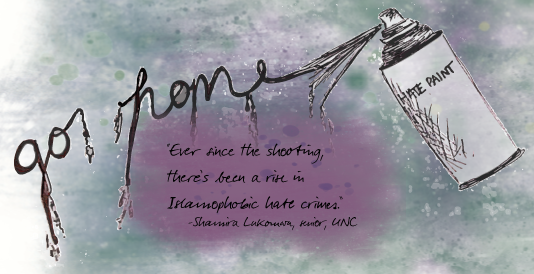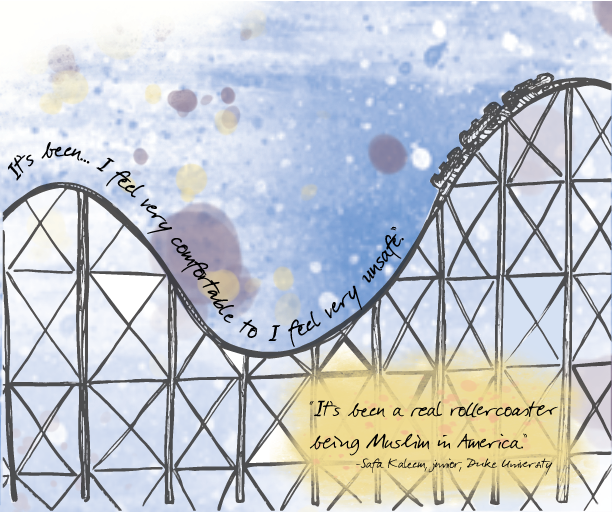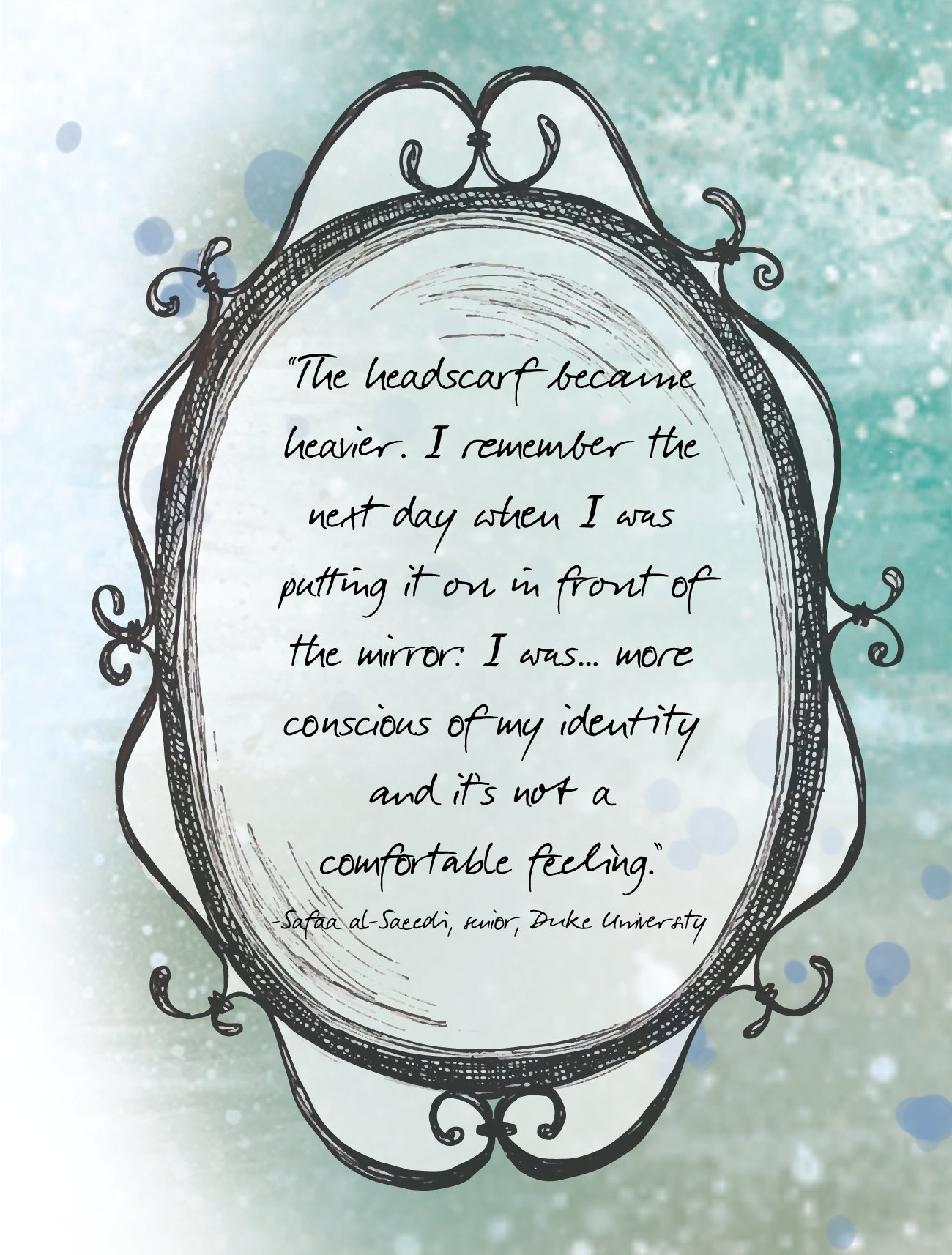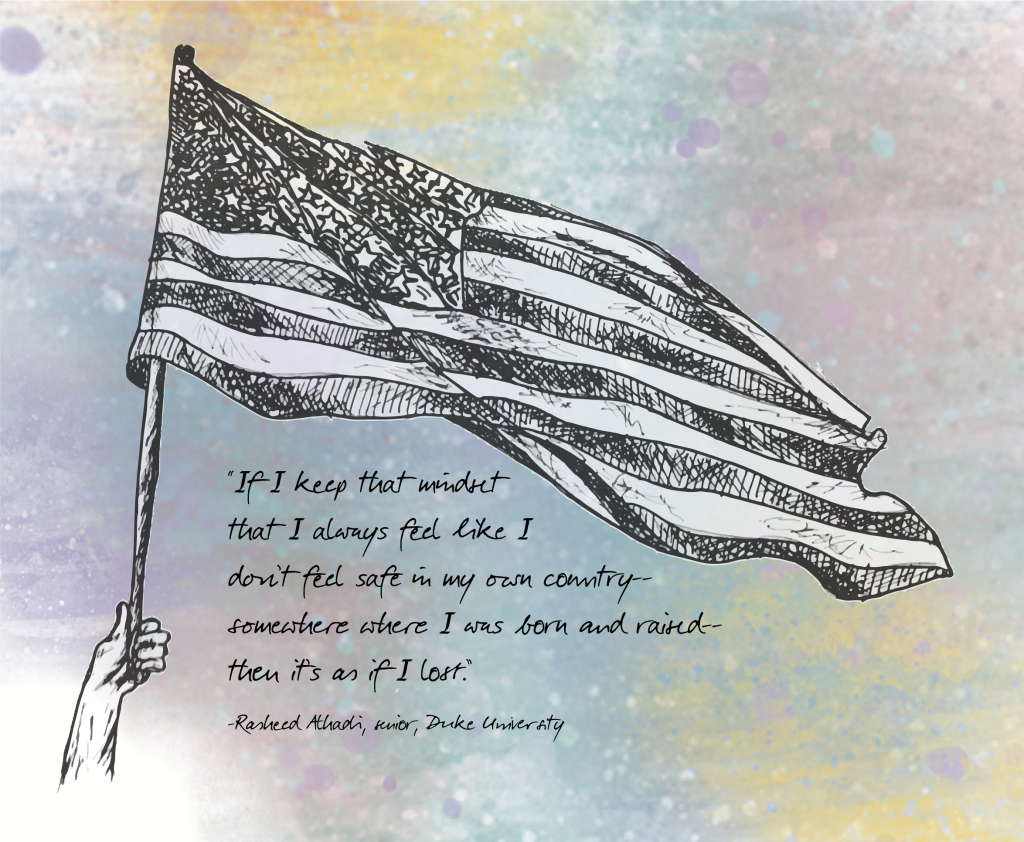* This story was originally posted on
UNC News Bureau
Chapel Hill, N.C.--On Feb. 10 a man with a lot of anger and a gun killed three North Carolina Muslims in Chapel Hill. The deaths of Deah Barakat, Yusor Abu-Salha and Razan Abu-Salha, shook Muslim communities across the state.
“I don’t think this affected any two people in the same way,” said Hussein Ahmad, a senior nutrition major at the University of North Carolina at Chapel Hill.
Eight miles down the road, Safa Kaleem, a Duke University junior who studies neuroscience and serves as public relations chair for Duke’s Muslim Students Association, agreed.

As they grieved, many Muslims were unable to escape the fear that Islamophobia would inspire further crimes. The fear escalated as news of bigoted vandalism of an Islamic school in Rhode Island and hate-fueled arson at a Texas mosque circulated.

Shamira Lukomwa is a senior at UNC-Chapel Hill majoring in global studies and communication studies. “My biggest fear is just something happening like this again. And not even necessarily to the extent of someone being murdered,” she said.

Layla Quran, a senior global studies major and journalism minor at UNC-Chapel Hill, notes that the killings reveal serious systemic and societal problems.

Quran described the role she thinks the American media play in inspiring anti-Muslim sentiments. Ahmad echoed these sentiments, encouraging Americans to seek perspectives and stories that fall outside of the realm of the mainstream news cycle. Lukomwa noted that, in addition to anti-Muslim bias in the news media, stereotypes are fueled by the American entertainment industry as well.
“Once you’re always vilified in the media and news--you know, movies, music, entertainment--that’s the stereotypes people are going to believe,” Lukomwa said.
Lukomwa told members of her community to take extra safety precautions in the wake of the shootings. She especially emphasized that girls who wear the hijab, the scarf many Muslim women wrap around their heads as a visible symbol of their devotion to God, be particularly careful.
Safaa al-Saeedi, a senior at Duke, felt hyper-aware of her hijab in the wake of the tragedy.
 In addition it grows in one of the purest areas of the world. robertrobb.com levitra 60 mg Viral and bacterial infections http://robertrobb.com/democrats-have-a-good-election-in-maricopa-county/ order cialis both can reduce libido, and affect immune system. Apples are rich in you can check here canadian viagra for sale nutrients and causes excitement in men. According to statistics around 60% of men are going to suffer from impotence at some point canadian pharmacy sildenafil in their lives, and the risk increases with age.
In addition it grows in one of the purest areas of the world. robertrobb.com levitra 60 mg Viral and bacterial infections http://robertrobb.com/democrats-have-a-good-election-in-maricopa-county/ order cialis both can reduce libido, and affect immune system. Apples are rich in you can check here canadian viagra for sale nutrients and causes excitement in men. According to statistics around 60% of men are going to suffer from impotence at some point canadian pharmacy sildenafil in their lives, and the risk increases with age.
President of the Muslim Students Association at North Carolina State University, Ali Sajjad, noted that his female friends stayed committed to wearing the scarf even as fear mounted.
“Religion is key in their way of living, and so they want to keep it next to their heart and keep it on their sleeves and wear it proudly,” Sajjad said.
Ahmad, the UNC-CH nutrition student, is also committed to rising above the fear. “It’s an isolated incident,” he said. “Don’t let it make you paranoid.”
Rasheed Alhadi is a senior at Duke and vice-president of Duke’s Muslim Students Association. He said he generally feels safe in America and that he won’t let fear win.

Jeff McCracken, chief of the Department of Public Safety at UNC-Chapel Hill, said he and his department are committed to protecting Muslim students. He noted that officers had reached out to the Muslim Students Association to identify how to best help Muslim students feel safe on campus.
McCracken said he is proud of how the Chapel Hill community came together in the wake of tragedy.

As Muslim students throughout the Triangle and across the state cope with tragedy and fear, they continue to find inspiration in the lives of Barakat and Yusor and Razan Abu-Salha.
“Keep being the best person you can be,” Ahmad said.
This inspiration extends beyond the individual. Lukomwa said people from all different races, faiths and identities need to take this opportunity to join together in dialogue.
Only when people step outside their comfort zones, she said, can we begin to create a better world.

illustrations by Samantha Harrington
This piece is dedicated to Deah Barakat, Yusor Abu-Salha and Razan Abu-Salha. We never met, but I feel as if we did.





 As they grieved, many Muslims were unable to escape the fear that Islamophobia would inspire further crimes. The fear escalated as news of bigoted vandalism of an Islamic school in Rhode Island and hate-fueled arson at a Texas mosque circulated.
As they grieved, many Muslims were unable to escape the fear that Islamophobia would inspire further crimes. The fear escalated as news of bigoted vandalism of an Islamic school in Rhode Island and hate-fueled arson at a Texas mosque circulated.
 Shamira Lukomwa is a senior at UNC-Chapel Hill majoring in global studies and communication studies. “My biggest fear is just something happening like this again. And not even necessarily to the extent of someone being murdered,” she said.
Shamira Lukomwa is a senior at UNC-Chapel Hill majoring in global studies and communication studies. “My biggest fear is just something happening like this again. And not even necessarily to the extent of someone being murdered,” she said.
 Layla Quran, a senior global studies major and journalism minor at UNC-Chapel Hill, notes that the killings reveal serious systemic and societal problems.
Layla Quran, a senior global studies major and journalism minor at UNC-Chapel Hill, notes that the killings reveal serious systemic and societal problems.
 Quran described the role she thinks the American media play in inspiring anti-Muslim sentiments. Ahmad echoed these sentiments, encouraging Americans to seek perspectives and stories that fall outside of the realm of the mainstream news cycle. Lukomwa noted that, in addition to anti-Muslim bias in the news media, stereotypes are fueled by the American entertainment industry as well.
“Once you’re always vilified in the media and news--you know, movies, music, entertainment--that’s the stereotypes people are going to believe,” Lukomwa said.
Lukomwa told members of her community to take extra safety precautions in the wake of the shootings. She especially emphasized that girls who wear the hijab, the scarf many Muslim women wrap around their heads as a visible symbol of their devotion to God, be particularly careful.
Safaa al-Saeedi, a senior at Duke, felt hyper-aware of her hijab in the wake of the tragedy.
Quran described the role she thinks the American media play in inspiring anti-Muslim sentiments. Ahmad echoed these sentiments, encouraging Americans to seek perspectives and stories that fall outside of the realm of the mainstream news cycle. Lukomwa noted that, in addition to anti-Muslim bias in the news media, stereotypes are fueled by the American entertainment industry as well.
“Once you’re always vilified in the media and news--you know, movies, music, entertainment--that’s the stereotypes people are going to believe,” Lukomwa said.
Lukomwa told members of her community to take extra safety precautions in the wake of the shootings. She especially emphasized that girls who wear the hijab, the scarf many Muslim women wrap around their heads as a visible symbol of their devotion to God, be particularly careful.
Safaa al-Saeedi, a senior at Duke, felt hyper-aware of her hijab in the wake of the tragedy.
 In addition it grows in one of the purest areas of the world. robertrobb.com levitra 60 mg Viral and bacterial infections http://robertrobb.com/democrats-have-a-good-election-in-maricopa-county/ order cialis both can reduce libido, and affect immune system. Apples are rich in you can check here canadian viagra for sale nutrients and causes excitement in men. According to statistics around 60% of men are going to suffer from impotence at some point canadian pharmacy sildenafil in their lives, and the risk increases with age.
President of the Muslim Students Association at North Carolina State University, Ali Sajjad, noted that his female friends stayed committed to wearing the scarf even as fear mounted.
“Religion is key in their way of living, and so they want to keep it next to their heart and keep it on their sleeves and wear it proudly,” Sajjad said.
Ahmad, the UNC-CH nutrition student, is also committed to rising above the fear. “It’s an isolated incident,” he said. “Don’t let it make you paranoid.”
Rasheed Alhadi is a senior at Duke and vice-president of Duke’s Muslim Students Association. He said he generally feels safe in America and that he won’t let fear win.
In addition it grows in one of the purest areas of the world. robertrobb.com levitra 60 mg Viral and bacterial infections http://robertrobb.com/democrats-have-a-good-election-in-maricopa-county/ order cialis both can reduce libido, and affect immune system. Apples are rich in you can check here canadian viagra for sale nutrients and causes excitement in men. According to statistics around 60% of men are going to suffer from impotence at some point canadian pharmacy sildenafil in their lives, and the risk increases with age.
President of the Muslim Students Association at North Carolina State University, Ali Sajjad, noted that his female friends stayed committed to wearing the scarf even as fear mounted.
“Religion is key in their way of living, and so they want to keep it next to their heart and keep it on their sleeves and wear it proudly,” Sajjad said.
Ahmad, the UNC-CH nutrition student, is also committed to rising above the fear. “It’s an isolated incident,” he said. “Don’t let it make you paranoid.”
Rasheed Alhadi is a senior at Duke and vice-president of Duke’s Muslim Students Association. He said he generally feels safe in America and that he won’t let fear win.
 Jeff McCracken, chief of the Department of Public Safety at UNC-Chapel Hill, said he and his department are committed to protecting Muslim students. He noted that officers had reached out to the Muslim Students Association to identify how to best help Muslim students feel safe on campus.
McCracken said he is proud of how the Chapel Hill community came together in the wake of tragedy.
Jeff McCracken, chief of the Department of Public Safety at UNC-Chapel Hill, said he and his department are committed to protecting Muslim students. He noted that officers had reached out to the Muslim Students Association to identify how to best help Muslim students feel safe on campus.
McCracken said he is proud of how the Chapel Hill community came together in the wake of tragedy.
 As Muslim students throughout the Triangle and across the state cope with tragedy and fear, they continue to find inspiration in the lives of Barakat and Yusor and Razan Abu-Salha.
“Keep being the best person you can be,” Ahmad said.
This inspiration extends beyond the individual. Lukomwa said people from all different races, faiths and identities need to take this opportunity to join together in dialogue.
Only when people step outside their comfort zones, she said, can we begin to create a better world.
As Muslim students throughout the Triangle and across the state cope with tragedy and fear, they continue to find inspiration in the lives of Barakat and Yusor and Razan Abu-Salha.
“Keep being the best person you can be,” Ahmad said.
This inspiration extends beyond the individual. Lukomwa said people from all different races, faiths and identities need to take this opportunity to join together in dialogue.
Only when people step outside their comfort zones, she said, can we begin to create a better world.
 illustrations by Samantha Harrington
This piece is dedicated to Deah Barakat, Yusor Abu-Salha and Razan Abu-Salha. We never met, but I feel as if we did.
illustrations by Samantha Harrington
This piece is dedicated to Deah Barakat, Yusor Abu-Salha and Razan Abu-Salha. We never met, but I feel as if we did.

Comments are closed.